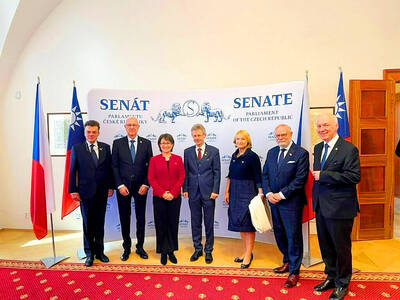The Chinese Nationalist Party (KMT) legislative caucus yesterday announced it would withdraw from future cross-party talks to protest an investigation into KMT Vice Chairman and Legislative Vice Speaker Chiang Pin-kun's (江丙坤) recent trip to China.
"Unless the Democratic Progressive Party [DPP] responds with goodwill, we will not participate in any cross-party negotiations in future," KMT caucus whip Chen Chieh (
The first casualties of the decision will be negotiations over President Chen Shui-bian's (
Legislative Speaker Wang Jin-pyng (
Wang said that he understood the KMT's reaction and considered it to be "natural."
"It is not surprising for them to express their displeasure with the judicial system meddling in politics," he said. "The treatment Chiang has received so far is unfair ... I hope the government will promptly deal with this incident, which has become political, or it will face more difficulties in future."
Chen Chieh said the investigation of Chiang indicated that the DPP government was using the judicial system as a tool to persecute opposition parties.
"Instead of appreciating the effort we have put into facilitating cross-strait economic development, the DPP government is using this sort of audacious political maneuver to repel its opponents," he said.
If the government failed to maintain political neutrality, future visits to China by KMT Chairman Lien Chan (
Earlier yesterday morning, PFP caucus whip Chen Chih-pin (
Other factors had contributed to the KMT's move, PFP caucus whip Lee Yung-ping (
"From the beginning of this session, the DPP caucus have been very stubborn and inflexible when it comes to negotiations," she said. "They don't seem to be sincere about putting into practice the 10-point agreement signed by President Chen and Chairman Soong and Premier Frank Hsieh's (謝長廷) pledge to reconcile and co-exist with opposition parties."
DPP caucus whip Chao Yung-ching (趙永清), however, dismissed Lee's accusation, saying that the PFP should be held responsible.
Another DPP caucus whip, Peter Lin (林進興), said the party caucus regretted the KMT caucus' announcement and said that this was the third time the KMT caucus had refused to participate in cross-party negotiations since the session began one month ago.
"While the KMT is happy to reach a consensus with China, it refuses to talk with us," he said. "I hope it changes its mind and makes an effort to reconcile with us with the same enthusiasm it has with Beijing."
also see stories:
Chiang explains his China trip to premier
Investigation opened into KMT vice chairman's visit
KMT's trip `violated law': Chen

FREEDOM OF NAVIGATION: The UK would continue to reinforce ties with Taiwan ‘in a wide range of areas’ as a part of a ‘strong unofficial relationship,’ a paper said The UK plans to conduct more freedom of navigation operations in the Taiwan Strait and the South China Sea, British Secretary of State for Foreign, Commonwealth and Development Affairs David Lammy told the British House of Commons on Tuesday. British Member of Parliament Desmond Swayne said that the Royal Navy’s HMS Spey had passed through the Taiwan Strait “in pursuit of vital international freedom of navigation in the South China Sea.” Swayne asked Lammy whether he agreed that it was “proper and lawful” to do so, and if the UK would continue to carry out similar operations. Lammy replied “yes” to both questions. The

Two US House of Representatives committees yesterday condemned China’s attempt to orchestrate a crash involving Vice President Hsiao Bi-khim’s (蕭美琴) car when she visited the Czech Republic last year as vice president-elect. Czech local media in March last year reported that a Chinese diplomat had run a red light while following Hsiao’s car from the airport, and Czech intelligence last week told local media that Chinese diplomats and agents had also planned to stage a demonstrative car collision. Hsiao on Saturday shared a Reuters news report on the incident through her account on social media platform X and wrote: “I

SHIFT PRIORITIES: The US should first help Taiwan respond to actions China is already taking, instead of focusing too heavily on deterring a large-scale invasion, an expert said US Air Force leaders on Thursday voiced concerns about the Chinese People’s Liberation Army’s (PLA) missile capabilities and its development of a “kill web,” and said that the US Department of Defense’s budget request for next year prioritizes bolstering defenses in the Indo-Pacific region due to the increasing threat posed by China. US experts said that a full-scale Chinese invasion of Taiwan is risky and unlikely, with Beijing more likely to pursue coercive tactics such as political warfare or blockades to achieve its goals. Senior air force and US Space Force leaders, including US Secretary of the Air Force Troy Meink and

Czech officials have confirmed that Chinese agents surveilled Vice President Hsiao Bi-khim (蕭美琴) during her visit to Prague in March 2024 and planned a collision with her car as part of an “unprecedented” provocation by Beijing in Europe. Czech Military Intelligence learned that their Chinese counterparts attempted to create conditions to carry out a demonstrative incident involving Hsiao, which “did not go beyond the preparation stage,” agency director Petr Bartovsky told Czech Radio in a report yesterday. In addition, a Chinese diplomat ran a red light to maintain surveillance of the Taiwanese